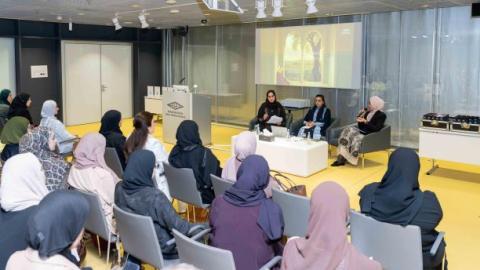
Qatar National Library has brought its key role in preserving the region’s heritage to the world stage in June through a series of online events.
Over 300 international delegates subscribed to four online classes throughout the month, showcasing how the state-of-the-art Preservation and Conservation Center at the Library is working with regional partners to preserve the rich cultural heritage of the Middle East and raise awareness about conservation of rare books, manuscripts and documents.
Qatar National Library is the International Federation of Library Associations and Institutions (IFLA) Preservation and Conservation Center (PAC) Regional Center for Arab countries and the Middle East. It aims to assist the development of conservation expertise and create a professional network of collaborative assistance to exchange knowledge toward the preservation of documentary heritage throughout the region.
In one event, 85 delegates from Qatar, the Gulf region and 32 other countries joined the international lecture, “Preservation and Conservation of Manuscripts: Founding Introductions.” Experts from the Manuscript Restoration Center at the Al-Abbas Holy Shrine Library in Iraq joined the Library to guide participants through the process of restoring and preserving documents of historical value to the Gulf and Arab region, as well as crisis preparedness and first aid to documentary heritage at risk.
Maxim Nasra, Book Conservation Specialist at the Library, said: “Historically, Iraq has played a leading role in the production of manuscripts concerning philosophy and natural science, as well as the development of written Arabic. It was extremely mutually beneficial to be able to share knowledge with the Al-Abbas Holy Shrine Library concerning their recent heritage rehabilitation efforts, as well as with such a wide variety of experts from different backgrounds.”
The Library also took part in an international webinar that explored the risks of reopening after the COVID-19 pandemic. The American Library Association International Relations Round Table Webinar Committee focused on information sharing from libraries around the world, looking at perspectives on sanitization from the Arab Region and reopening strategies at a global level. The IFLA PAC Regional Center at the Library, along with UCL Qatar, will publish a report later this year about the sanitization of items and facilities in libraries.
Also in June, the Library’s Preservation and Conservation team ran an online tutorial for libraries and archives in the Middle East to discuss prevention procedures for reopening to the public in the context of the pandemic. Other workshops in June, delivered by experts from the Library and the British Library, focused on the history of and conservation risks associated with various formats of Arab audio recordings, from the 1857 phonautograph to 21st-century digital formats.
“Heritage can be an important driver for peace in areas of conflict, and it can help encourage inclusive societies by providing communities with a narrative of a common identity,” said Nasra.
The Library has been the IFLA PAC Regional Center since 2015, and June’s events were part of its role in leading preservation of the region’s heritage. The Library works closely with institutions in the region to equip experts with the skills needed to conserve and preserve the rich cultural heritage of Qatar and the region for generations to come.
Stephane Ipert, Conservation and Preservation Manager at the Library and Director of the IFLA PAC Regional Center, said: “It is satisfying to see that our PAC Center is continually recognized at an international level, and being able to respond to questions from a broad range of delegates regarding the conservation of rare books, manuscripts and documents in the Middle East at this unprecedented time is vital to growing our reputation further.”
Ipert spoke in March this year at the World Customs Organization (WCO) in Brussels, Belgium, where he presented the activities of the IFLA PAC Regional Center to fight the trafficking of manuscripts, books and archives in the Middle East and North Africa.
“Despite the current lockdown, we are working harder than ever to help preserve the region’s heritage through providing hands-on training opportunities for experts, in coordination with our partners,” he said.







